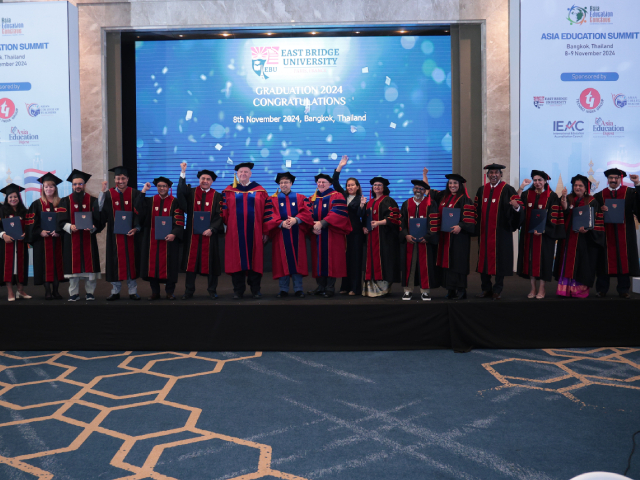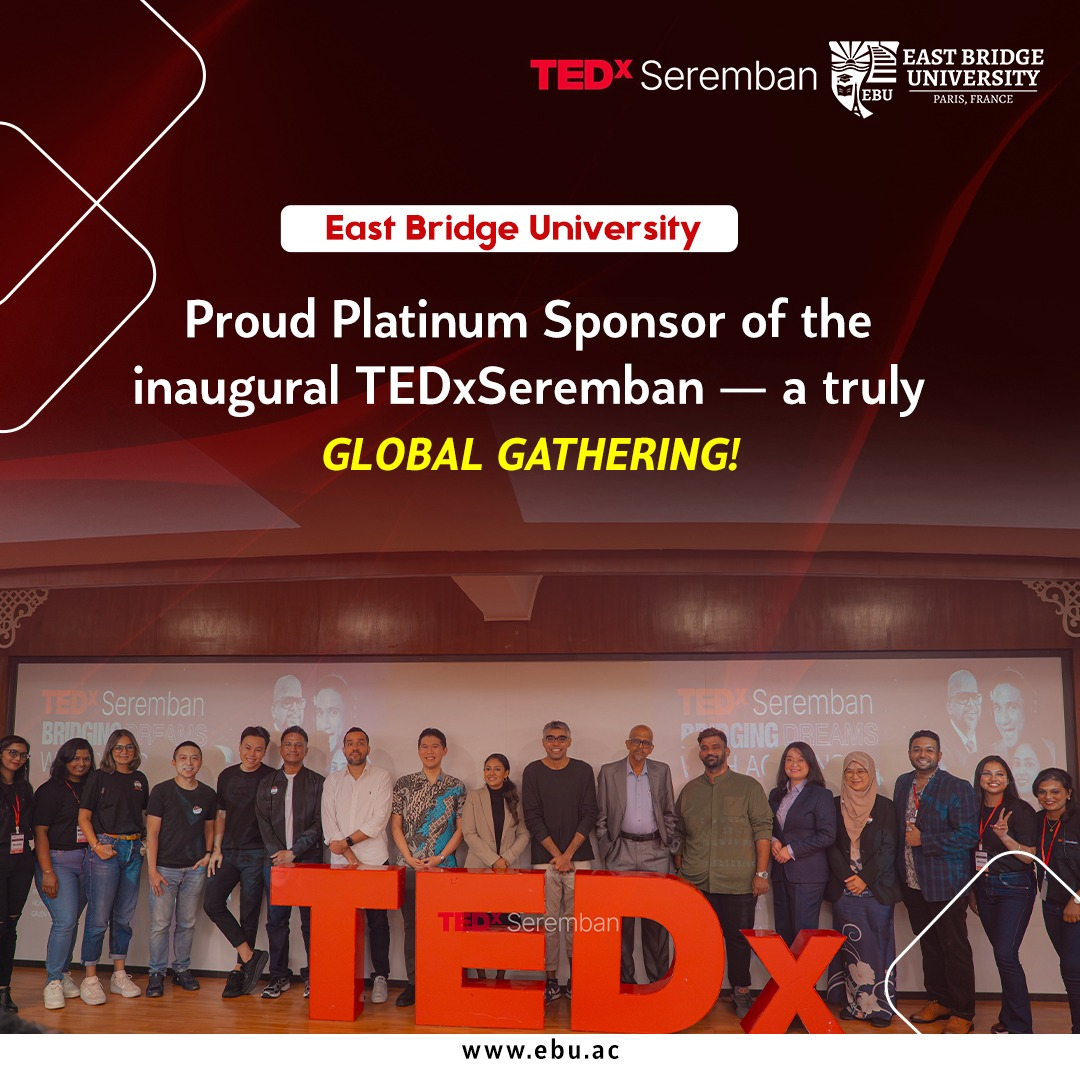- Programs
- Explore EBU
- Academics
- Admission
- Alumni
- Convocation
- Contact
- Blog
- News

- Home
- Programs
- Explore EBU
- Academics
- Admission
- Alumni
- Convocation
- Contact
- Blog
- News

 East Bridge University recognizes that achieving the Sustainable Development Goals requires collaborative action across sectors, borders, and disciplines. Our commitment to SDG 17 reflects our belief that meaningful partnerships amplify impact and create sustainable solutions to global challenges. Through strategic collaborations with governments, NGOs, educational institutions, and communities worldwide, we work to strengthen the means of implementation and revitalize global partnerships for sustainable development. Our approach integrates policy engagement, cross-sectoral dialogue, knowledge sharing, and educational innovation to advance all SDGs through collective action.
East Bridge University recognizes that achieving the Sustainable Development Goals requires collaborative action across sectors, borders, and disciplines. Our commitment to SDG 17 reflects our belief that meaningful partnerships amplify impact and create sustainable solutions to global challenges. Through strategic collaborations with governments, NGOs, educational institutions, and communities worldwide, we work to strengthen the means of implementation and revitalize global partnerships for sustainable development. Our approach integrates policy engagement, cross-sectoral dialogue, knowledge sharing, and educational innovation to advance all SDGs through collective action.
Our Global SDG Partnership Network stands as a testament to East Bridge University’s commitment to collaborative action in support of sustainable development. This initiative is designed to operate at multiple levels—policy engagement, educational partnerships, and international forums—creating a holistic platform for impact.
On the educational front, we actively foster partnerships aimed at widening access and opportunity. Current collaborations extend to countries such as Myanmar, Vietnam, and Sri Lanka, where our focus is on professional development for low-income groups. By offering internationally recognized qualifications and training, we empower individuals to enhance their credibility, improve employment prospects, and open doors to global opportunities. These partnerships are rooted in equity and inclusion, ensuring that education contributes directly to the SDGs by reducing inequality and strengthening livelihoods.
In addition to education, our network emphasizes cross-sectoral dialogue through international conferences and forums. We host and participate in events across Thailand, Laos, the Philippines, India, and Nepal, bringing together government leaders, civil society organizations, academics, and industry experts. These platforms serve not only as spaces for knowledge exchange but also as incubators for joint initiatives, policy recommendations, and pilot projects that address critical issues such as climate resilience, digital inclusion, and community-based development.
With 18 organizations already engaged, spanning governments, NGOs, and academic institutions, our network facilitates collaboration that translates into scalable solutions. Through these partnerships and forums, we are building a future where sustainable development is not just a vision but a shared, actionable agenda across regions.
Regional Policy Engagement and Development: We maintain direct involvement with national governments and regional NGOs in SDG policy development, contributing expertise in identifying challenges, developing strategies, modeling intervention outcomes, and enabling adaptive management. Our faculty and students actively participate in policy consultations across the Middle East, Southeast Asia, and South Asia regions, informing evidence-based approaches to sustainable development.
Cross-Sectoral SDG Dialogue Leadership: EBU initiates and participates in cross-sectoral dialogue about the SDGs through international conferences, policy forums, and multi-stakeholder workshops. We host annual SDG symposiums bringing together government officials, NGO leaders, academic researchers, and community representatives to share best practices, identify collaboration opportunities, and coordinate regional SDG implementation efforts.
International Best Practice Development: Through international collaboration and research partnerships, we review comparative approaches and develop international best practices for tackling the SDGs. Our research network includes partnerships with universities in several countries currently, enabling comparative analysis of SDG implementation strategies and the development of evidence-based recommendations for policy and practice.
NGO Collaboration for SDG Implementation: We collaborate extensively with NGOs to tackle the SDGs through student volunteering programs engaging 100+ students annually, joint research programs addressing poverty alleviation and education access, and community development initiatives. These partnerships leverage our academic expertise while providing practical learning opportunities for our students and measurable community impact.
Comprehensive SDG Reporting and Transparency: EBU publishes dedicated progress reports for SDGs 1, 4, 5, and 17, providing transparent documentation of our initiatives, outcomes, and impact metrics. Our separate SDG reports enable detailed analysis of our contributions to each goal while our integrated annual sustainability report demonstrates the interconnected nature of our SDG work and overall institutional commitment.
SDG Education Integration Across Curriculum: We maintain a commitment to meaningful education around the SDGs across our university, with sustainability and SDG concepts integrated throughout our full curriculum and mandatory education for all 1,558 students. Our approach ensures that every graduate understands the SDGs and their role in achieving sustainable development, creating a generation of informed global citizens and change agents.
Dedicated Sustainability and SDG Courses: Our academic programs include dedicated courses and full degree concentrations that address sustainability and the SDGs, serving 423 students annually across undergraduate and graduate levels. These specialized programs prepare students for careers in sustainable development while contributing research and innovation to SDG implementation challenges.
Community Outreach and Alumni Engagement: We provide dedicated outreach educational activities for the wider community, including alumni networks, local residents, and displaced populations. Our programs reach 2,890 community members annually through workshops, seminars, and capacity-building initiatives that extend SDG education and awareness beyond our enrolled student population.
 Sustainability Literacy Assessment and Development: We systematically measure and track the sustainability literacy of our students through comprehensive assessment programs, ensuring that graduates possess the knowledge, skills, and competencies needed to contribute effectively to SDG achievement. Our assessment framework includes pre- and post-program evaluations, practical project assessments, and long-term impact tracking.
Sustainability Literacy Assessment and Development: We systematically measure and track the sustainability literacy of our students through comprehensive assessment programs, ensuring that graduates possess the knowledge, skills, and competencies needed to contribute effectively to SDG achievement. Our assessment framework includes pre- and post-program evaluations, practical project assessments, and long-term impact tracking.
Technology-Enhanced Partnership Platforms: We leverage digital platforms and innovative technologies to facilitate global partnerships, including virtual collaboration tools, online knowledge sharing platforms, and AI-powered matching systems that connect partners with complementary expertise and resources. These tools enable efficient coordination across time zones and geographic boundaries.
Research and Innovation for SDG Solutions: Our faculty and students conduct cutting-edge research addressing SDG implementation challenges, with particular focus on education access, poverty alleviation, gender equality, and partnership effectiveness. Our research contributes to the global knowledge base while informing our own partnership strategies and program development.
Monitoring, Evaluation, and Adaptive Management: We maintain comprehensive monitoring and evaluation systems for all partnership initiatives, tracking both quantitative outcomes and qualitative impact indicators. Our adaptive management approach enables continuous improvement of partnership strategies based on evidence and stakeholder feedback, ensuring maximum effectiveness and sustainability.
Global Network Coordination and Leadership: EBU serves as a regional hub for SDG coordination, facilitating connections between partners, sharing resources and expertise, and providing leadership in multi-stakeholder initiatives. Our coordination role amplifies the collective impact of our partnership network while positioning EBU as a trusted convener and facilitator of collaborative action.
Capacity Building and Knowledge Transfer: Through our partnerships, we provide capacity building support to organizations and communities working on SDG implementation, sharing our expertise in education, research, and program management while learning from partners’ experiences and local knowledge. This mutual exchange strengthens the entire partnership network and enhances collective capabilities.